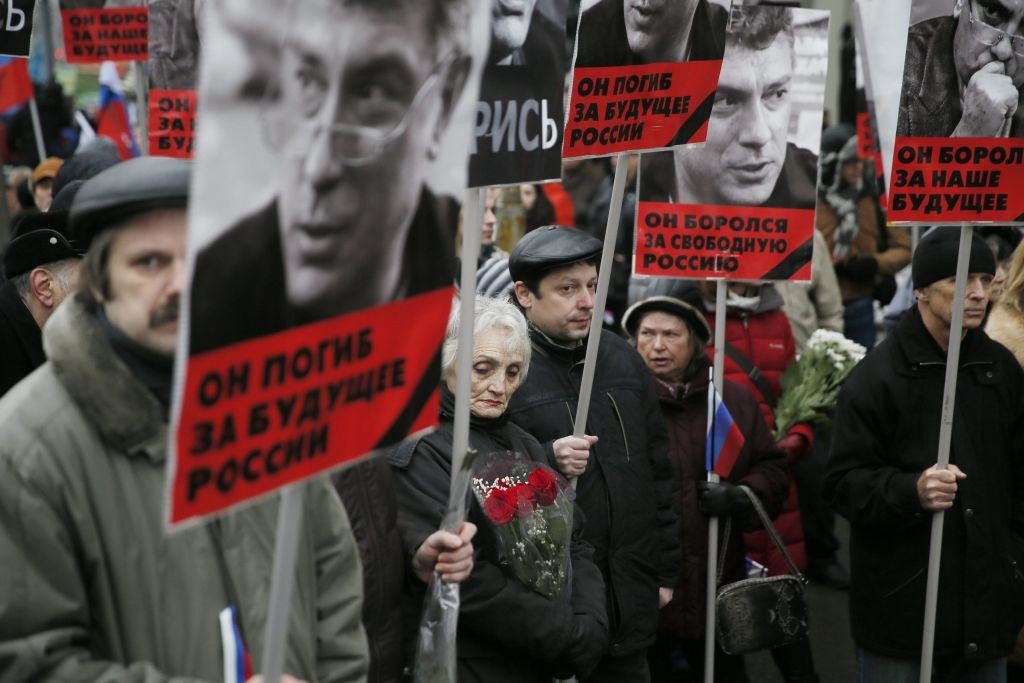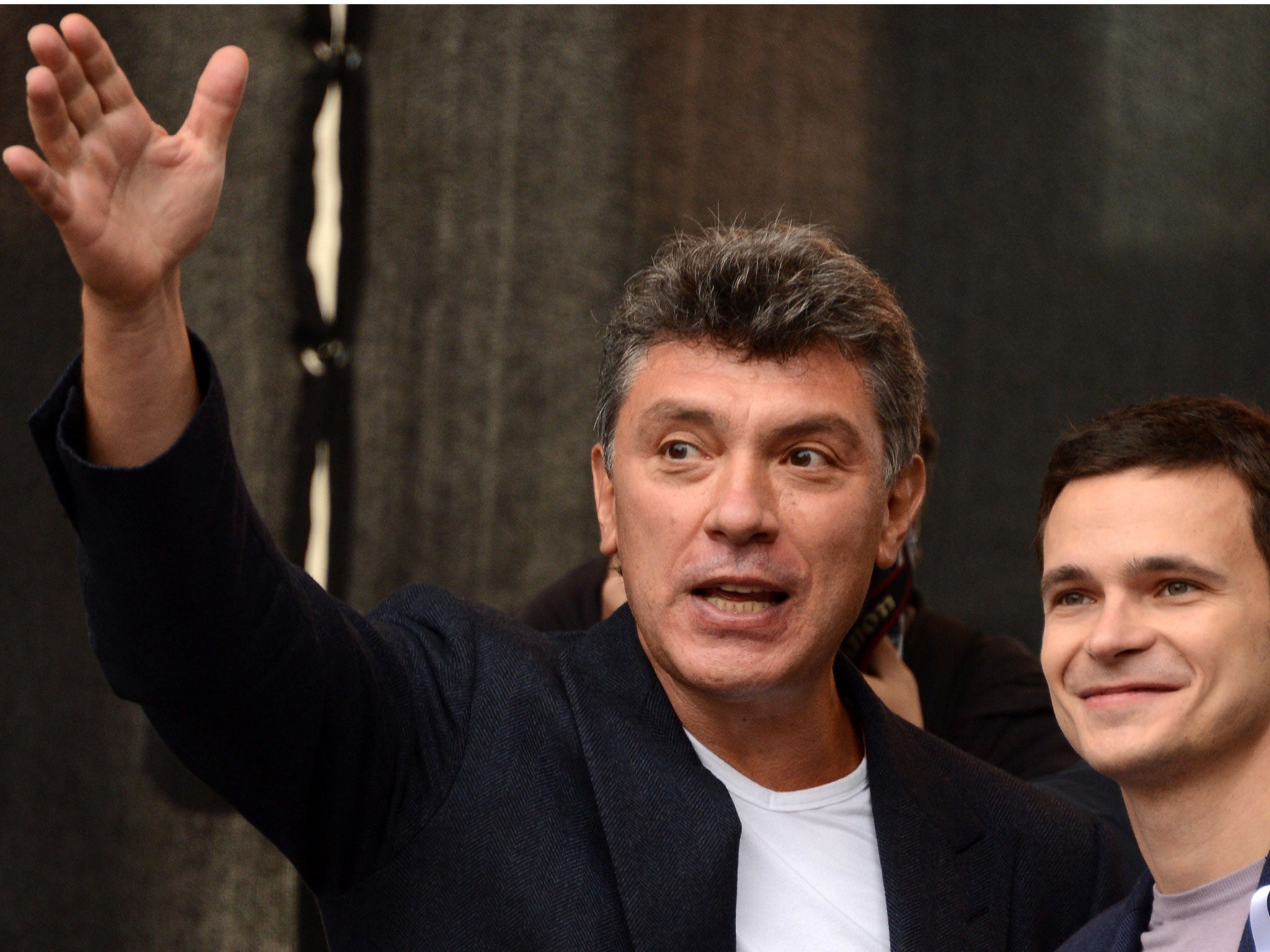Boris Nemtsov shot dead: Thousands take to streets of Moscow as planned opposition rally becomes a mass protest in memory of Russian politician
President Putin bears the brunt of protesters' anger at murder of opposition leader

The mood in Moscow was grim, a quiet rage running through the crowd. What had been planned as an opposition march against Vladimir Putin became something more, a massed protest against the bloody silencing of another voice of dissent.
Almost 20,000 people walked through the streets, braving the cold and the rain to protest against the murder of the opposition leader Boris Nemtsov today. Shot four times in the back on the Great Moskvoretsky Bridge near the Kremlin on Friday night by unknown assailants, Mr Nemtsov had been due to speak at today’s rally. Instead his picture was on almost every placard. There was no chanting typical of opposition protests, no smiles and no speeches.
The route from the Kitai Gorod metro station to the Moskvoretsky Bridge had been approved by the authorities and throughout the march helicopters could be heard overhead. On the ground the presence of armed police was overwhelming.
“Heroes never die. Those bullets pierced each and every one of us,” read one placard.
A day after Russian national investigators speculated that anything from Islamic extremism to a business dispute could have been the motive for the killing, many demonstrators placed the blame squarely on Vladimir Putin.
“They will never tell us who the killers were. But there is no doubt it was done by professionals, and the fact that it happened right next to the Kremlin – that says a lot, because ordinary hitmen wouldn’t be able to pull that off,” said Alexander Gucharov, a student who held a placard with an image of Mr Putin with the words: “Formerly a spy, today an executioner, conman and thief. Shame! Vladimir Putin: the godfather of the Kremlin.”
He added: “They’d get caught within 30 minutes. The real killer was the organiser of the war with Ukraine.”
For Lyudmila Gucharova, Mr Nemtsov had been the “last hope” for the opposition. “I guess that’s why they had to kill him,” she said.
Another demonstrator, Vyacheslav Uramistrov, held a large portrait of Mr Nemtsov alongside a Russian flag. Calling the killing a “great loss for all of Russia”, he broke down when recalling his past encounters with the politician. “I don’t even know what words can describe this feeling. I don’t know what we’ll do,” he said.
A group of women clutching Russian flags said they came to the march because they “felt it was their duty”. “We’re tired of having to feel afraid. That’s why we came,” said Olga Busova, a pensioner.
Vladimir Milov, a former deputy energy minister and current opposition figure and close colleague of Mr Nemtsov, dismissed the official explanations for the killing.
“I really have no doubt that the Russian security services were involved. Maybe the Federal Security Service or the Federal Guard Service. I think it was precisely these agencies that organised the killing,” Mr Milov told The Independent.
“That entire territory [around the Kremlin] is part of a special zone with heightened security. It’s essentially always on lockdown, with security services monitoring and listening to everything. So it’s very hard for me to imagine that someone was able to pull off a murder in that area without Putin’s consent, to kill a leading opposition figure right in front of the Kremlin,” said Mr Milov. “This tells us that either the security protocols around the Kremlin are completely ineffective and useless, or they were deliberately shut down for Nemtsov’s murder.”

Investigators who answer to Mr Putin have offered a 3m rouble reward, around £32,000, for information on Mr Nemtsov’s death. They say they are pursuing several lines of inquiry, including the possibility that Mr Nemtsov, who was Jewish, was killed by Islamists or that the opposition killed him to blacken Mr Putin’s name. “Putin noted that this cruel murder has all the makings of a contract hit and is extremely provocative,” the President’s spokesman Dmitry Peskov said.
But Mr Milov scoffed at Mr Putin’s explanation of the killing as a provocation, saying the real motive was painfully obvious. “This was an attempt to instill fear among members of the opposition; to scare the remaining opposition members off.”
Another potential motive for the killing, he claimed, was Mr Nemtsov’s support for the sanctions imposed by the West on Russia over ongoing events in Ukraine.
Ukraine’s President, Petro Poroshenko, had claimed Mr Nemtsov was killed because he planned to disclose evidence of Russia’s alleged, and strongly denied, involvement in Ukraine’s conflict. “He said he would reveal persuasive evidence of the involvement of Russian armed forces in Ukraine,” said Mr Poroshenko. “Someone was very afraid of this … They killed him.”
Other leaders have been less accusatory, but demanded a thorough and transparent investigation into the killing. The US President, Barack Obama, demanded an “impartial” inquiry while the German Chancellor, Angela Merkel, said Mr Putin must “assure himself that this assassination is elucidated and that its perpetrators are held accountable”.
The wife of the murdered Russian spy Alexander Litvinenko said Mr Nemtsov’s shooting was the Russian government’s way of saying that anyone who spoke out against Mr Putin would be killed. Marina Litvinenko told the BBC it was a “way to present that anybody who will try to say something against us will be killed”.
Human rights activists called for authorities to set up a monument to Mr Nemtsov in the city, an idea which deputy mayor Leonid Pechatnikov promised would be considered in comments to Interfax news agency. Alexander Cherkasov of the Memorial human rights group expressed doubt that Moscow authorities would allow it, however. “There are streets named after [slain investigative journalist] Anna Politkovskaya all over the world. In Moscow, there is no such street,” he said. “There is a problem of political terror and a problem with monuments to the victims of political terror in Russia,” Mr Cherkasov told the Interfax news agency.
Estonia: Close call at the ballot box
Estonia went to the polls today in an election dominated by economic issues and security concerns due to Russia’s actions in Ukraine.
Opinion polls indicated a close race between the governing centre-right coalition, led by the Prime Minister Taavi Roivas’ Reform Party, and the opposition Centre Party, favoured by ethnic Russians. The ruling coalition holds 52 of the 101 seats in parliament. Many are worried Moscow might try to boost its influence in the country, where a quarter of its 1.3 million residents are ethnic Russians.
Jari Tanner
Join our commenting forum
Join thought-provoking conversations, follow other Independent readers and see their replies
Comments